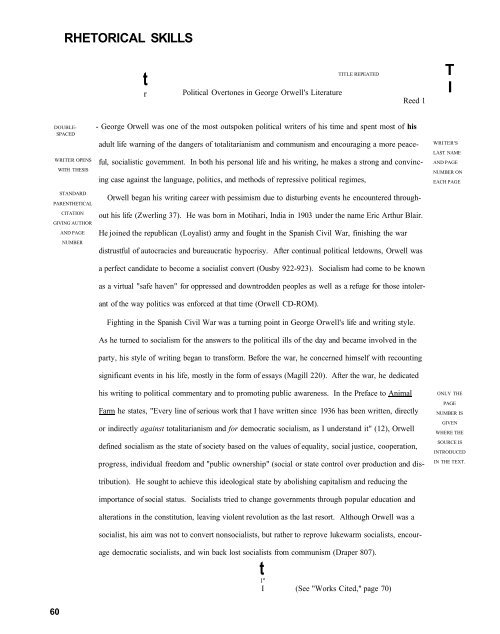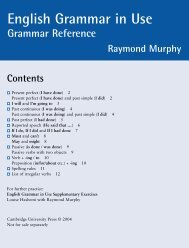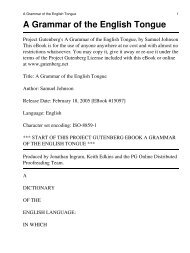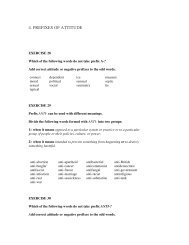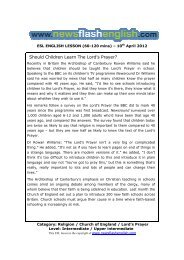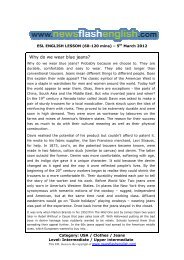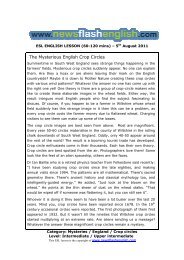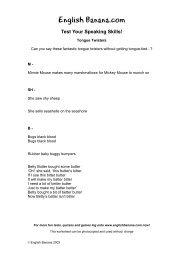RHE<strong>TO</strong>RICAL SKILLStrPolitical Overtones in George Orwell's LiteratureTITLE REPEATEDReed 1TIDOUBLE-SPACEDWRITER OPENSWITH THESISSTANDARDPARENTHETICALCITATIONGIVING AUTHORAND PAGENUMBER- George Orwell was one of the most outspoken political writers of his time and spent most of hisadult life warning of the dangers of totalitarianism and communism and encouraging a more peaceful,socialistic government. In both his personal life and his writing, he makes a strong and convincingcase against the language, politics, and methods of repressive political regimes,Orwell began his writing career with pessimism due to disturbing events he encountered throughouthis life (Zwerling 37). He was born in Motihari, India in 1903 under the name Eric Arthur Blair.He joined the republican (Loyalist) army and fought in the Spanish Civil War, finishing the wardistrustful of autocracies and bureaucratic hypocrisy. After continual political letdowns, Orwell wasa perfect candidate to become a socialist convert (Ousby 922-923). Socialism had come to be knownas a virtual "safe haven" for oppressed and downtrodden peoples as well as a refuge for those intolerantof the way politics was enforced at that time (Orwell CD-ROM).Fighting in the Spanish Civil War was a turning point in George Orwell's life and writing style.As he turned to socialism for the answers to the political ills of the day and became involved in theparty, his style of writing began to transform. Before the war, he concerned himself with recountingsignificant events in his life, mostly in the form of essays (Magill 220). After the war, he dedicatedhis writing to political commentary and to promoting public awareness. In the Preface to AnimalFarm he states, "Every line of serious work that I have written since 1936 has been written, directlyor indirectly against totalitarianism and for democratic socialism, as I understand it" (12), Orwelldefined socialism as the state of society based on the values of equality, social justice, cooperation,progress, individual freedom and "public ownership" (social or state control over production and distribution).He sought to achieve this ideological state by abolishing capitalism and reducing theimportance of social status. Socialists tried to change governments through popular education andalterations in the constitution, leaving violent revolution as the last resort. Although Orwell was asocialist, his aim was not to convert nonsocialists, but rather to reprove lukewarm socialists, encouragedemocratic socialists, and win back lost socialists from communism (Draper 807).t1"I (See "Works Cited," page 70)WRITER'SLAST NAMEAND PAGENUMBER ONEACH PAGEONLY THEPAGENUMBER ISGIVENWHERE THESOURCE ISINTRODUCEDIN THE TEXT.60
RHE<strong>TO</strong>RICAL SKILLS•i34C APA documentationThe style of documentation described in the PublicationManual of the American Psychological Association*uses parenthetical citations in the written material to documentall sources of quotations, paraphrased statements,ideas, or other secondary sources. These parentheticalcitations refer to a list of References, a complete anddetailed list of sources at the end of the paper.Typically, in a citation, you use the author's last name(only) in a sentence that introduces the material to bedocumented, and, immediately following the name, youput the date of publication in parentheses. When theauthor's name is not mentioned in your text, you includethe author's last name followed by a comma and the dateof publication in parentheses at the end of the sentence,or, if you have referred to more than one source, the endof the applicable clause. In addition, when you cite adirect quotation, always include page numbers with yourcitations or in separate parentheses at the conclusion ofthe quotation and use p. or pp. with the page numbers.Do not supply page numbers foT any other source unlessyou have a good reason to, such as supplying the pagenumbers for a passage that might be very difficult tofind. For more in<strong>format</strong>ion about the source, all thereader has to do is find the author's name on theReferences page at the end of the paper. (If two authorshave the same last name, use the authors' initials). Onelast very important point: because APA papers are generallyused in the social sciences (a scientific paperexplains what has been substantiated by research withina very specific area), the style demands the use of thepast tense or pre sent-perfect tense for sources cited:Dawson and Meyers [1989) reported no fewerthan twelve Incidents of Prozac being ineffectiveafter six months of use.The present tense can be used in the text for generalizationsand references to continuing conditions:The use of all drugs prescribed to alter behaviorcontinues to require great care and follow through.For full in<strong>format</strong>ion about the APA style, consult theofficial APA manual in your library or bookstore.EXAMPLES:Of a citation in the paper:Lear (1998) concludes that William Conant wasthe most authoritative doctor in Merced County,because he had treated all of the residents formany years.Of an entry in the References list:Osborne, D., & Gaebler, T. (1998(. Reinventinggovernment: How the entrepreneurial spirit istransforming the public sector. New York:NAL-Dutton.CITING SOURCES WITHIN THE TEX<strong>TO</strong>F YOUR PAPER1. Author named in your textIf the author's name appears in your text, cite only thedate of the publication in parentheses, right after theauthor's name.Resener (1997) categorizes the homeless accordingto the reasons for their displacement: the "Seeker,"the "Mentally 111," the "Stranded," and the "Selfinflicted."2, Author not named in your textWhen you do not mention the author in your text, citehis last name, followed by a comma and the year ofpublication, in parentheses.Some major psychologists argue that the emphasison group therapy and the dynamics of group discussionsmay dampen full participation by somesubjects (Waller, 1991).3.Using page numbersWhen you cite a quotation, you must include pagenumbers, either in the parentheses with the author anddate of publication, or in separate parentheses at theconclusion of the quotation. Use p. or pp. before thepage numbers.Boorstein (1996, pp. 38-39) explained that "fewresearchers really believe that the impact of thenew interviewing protocols issued by theAssociation would have a significant impact on theconclusions of their studies or on the tables compiledat the end of the year."Holden (1990) reported the following:4. Two authorsUnfortunately, in the past, the words retirementhome often brought to mind impersonal,lonely places. However, conditions inretirement can vary, some homes earningawards for excellence in nursing care, andothers earning citations for negligence.Regulations regarding nursing homes arebecoming stricter than they once were, and itis possible to find retirement conditions thatare positive and comfortable (p. 382).When a work has two authors, cite both last names eachtime you refer to their work. Within the parentheses,use an ampersand (&), but if you refer to them in yourtext, spell out the word and.Handler and Neeley (1998) felt that, while thestudy of grammar is interesting and satisfying toteachers, it does not translate to better writing onthe part of the students.A well-known study reveals that, while the studyof grammar is interesting and satisfying to teachers,it does not translate to better writing on thepart of the students (Handler & Neeley, 1998).^Publication Manual of the American Psychology Association, 4thEdition (Ninth printing, June 1997).61


